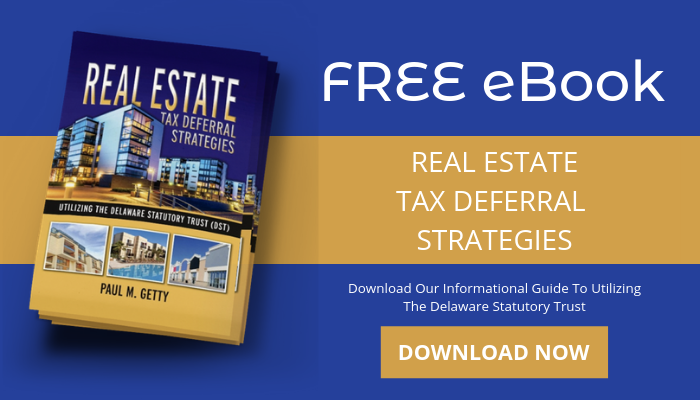When most of us think of retirement planning, saving instruments like a 401(k) or IRA often come to mind. That makes sense because these plans not only allow us to save for retirement on a tax-deferred basis, but they will also prove to be a significant source of income we will need once we retire.
However, if you own investment property, there may be another income strategy well worth considering as part of your overall retirement plan—the 1031 exchange.
As a reminder, the 1031 exchange is part of the Internal Revenue Tax Code, which allows you to defer the capital gains tax on the sale of investment property when you reinvest the proceeds from that sale into like-kind property. So consider these following examples as they relate to retirement planning.
Case Study: 1031 Exchange for Retirement Income
Steve and Carol Henderson* had owned a multi-family apartment complex for years. It had proven to be a source of steady income that helped put their kids through college, pay for a few weddings, and even allowed them to take their entire family on a European vacation.
But as they neared retirement age, they found the responsibilities of replacing tenants, keeping up on maintenance, and just managing their property was becoming increasingly burdensome. They didn’t want to give up the income from this property, but they knew they didn’t have the energy or desire to be landlords when they retired.
Their financial advisor suggested they consider selling their property using a 1031 exchange and reinvesting in a like-kind Delaware Statutory Trust (DST). This would allow them to defer capital gains taxes by purchasing fractional shares in DSTs while eliminating active property management responsibilities. In addition, the DST would provide regular distributions, which would be an essential source of income for their retirement. Steve and Carol followed that recommendation and still today consider their 1031 exchange into DSTs as a retirement strategy just as important as their IRAs and 401(k).
You also might not be aware that a 1031 exchange can play an important role in the retirement planning process when outlining your estate planning desires. Here is an example.
Case Study: 1031 Exchange for Estate Planning
John Richards*, a widower, owned several single-family homes as investment properties, which had all provided a reliable income stream over the years. But, at age 75 and in failing health, John could no longer keep up with the management responsibilities on the properties and had to ask his son and daughter to assist.
Unfortunately, they both lived with their families’ hours away from the rental homes and couldn’t help much. Knowing this, John sought out his investment advisor and asked if he should put the properties up for sale. He had been thinking about his estate and how he wanted to pass his wealth to his children.
His advisor suggested that John consider selling all the homes and reinvesting the sales proceeds into a DST portfolio consisting of multiple properties. That would solve the problem of not managing the properties, and it would also provide a tremendous tax benefit. Here’s how.
By investing in multiple DSTs, John would own fractional shares in a diversified portfolio of institutional-quality fully managed properties that, upon his death, would be passed to his two children. Thus, his son and daughter could retain ownership in the DSTs and receive income distributions. But, most importantly, they would inherit the total invested amount of the proceeds from the sale of the investment properties on a stepped-up basis. A step-up in basis adjusts the value of inherited property to current market values at time of passing. In essence, that would eliminate all capital gains tax liability on the appreciated value of the sold homes.
John followed that advice and rested much easier in his remaining years, knowing that he had chosen a powerful “retirement strategy” using a 1031 exchange to pass as much of his accumulated wealth as possible on to his children.
We hope these examples have helped illustrate how a 1031 exchange can be more than just an investment strategy to use while you are in your working years. It can also be an essential part of your retirement plan.
For more information, please contact us today for a free consultation. You can reach us at 866 398-1031 or info@FirstGuardianGroup.com.
*Client names modified for blog post
Please feel free to download our FREE ebook to learn more about real estate tax deferral strategies!
Help Save 1031 Exchanges









Your Comments :